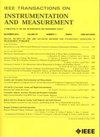Data-Driven Bayesian Framework to Mitigate Smart Meter Asynchrony in Forecasting Aided Distribution System State Estimation
IF 5.6
2区 工程技术
Q1 ENGINEERING, ELECTRICAL & ELECTRONIC
IEEE Transactions on Instrumentation and Measurement
Pub Date : 2025-06-09
DOI:10.1109/TIM.2025.3577850
引用次数: 0
Abstract
Smart meters (SMs) are pivotal in improving the accuracy of distribution system state estimation (DSSE) in the modern-day monitoring and control paradigm. Due to limited communication bandwidth or signal strength, the synchronized data conveyance from SMs to the control center remains an onerous task. Performing DSSE using nonsynchronized SMs introduces asynchrony errors, which affect estimation accuracy. Toward this objective, a gated recurrent unit (GRU)-based SM data forecasting is implemented to facilitate SM data imputation, thereby mitigating SM asynchrony. Simultaneously, the effect of out-of-date (OD) variance incurred due to SM asynchrony, given the node load changes, needs to be priorly detected and iteratively updated to improve estimation results. This burdensome task gets eliminated by adopting variational Bayesian (VB) adaptive cubature information filter (VB-ACIF), which can intrinsically adapt the unknown measurement uncertainties incurred by the SM OD variances. Numeric results from test systems reveal that forecasting aided-DSSE (FA-DSSE) using VB-ACIF delivers improved estimation accuracy and is suitable for practical distribution system operation. The proposed estimator’s robustness in dealing with multiple anomalies and correlated data communication failure (CF) is also validated for the proposed FA-DSSE framework.数据驱动贝叶斯框架缓解智能电表异步预测辅助配电系统状态估计
智能电表(SMs)是提高配电系统状态估计(DSSE)准确性的关键。由于通信带宽或信号强度的限制,从SMs到控制中心的同步数据传输仍然是一项繁重的任务。使用非同步的SMs执行DSSE会引入异步错误,从而影响估计的准确性。为此,实现了基于门控循环单元(GRU)的SM数据预测,方便了SM数据的输入,从而减轻了SM的异步性。同时,在给定节点负载变化的情况下,需要优先检测和迭代更新由SM异步引起的过时(OD)方差的影响,以改进估计结果。采用变分贝叶斯(VB)自适应培养信息滤波器(VB- acif),可以从本质上适应SM OD方差带来的未知测量不确定性,从而消除了这一繁琐的任务。试验系统的数值结果表明,采用VB-ACIF的预测辅助dsse (FA-DSSE)具有较高的估计精度,适用于实际配电系统运行。在FA-DSSE框架中验证了该估计器在处理多异常和相关数据通信故障(CF)方面的鲁棒性。
本文章由计算机程序翻译,如有差异,请以英文原文为准。
求助全文
约1分钟内获得全文
求助全文
来源期刊

IEEE Transactions on Instrumentation and Measurement
工程技术-工程:电子与电气
CiteScore
9.00
自引率
23.20%
发文量
1294
审稿时长
3.9 months
期刊介绍:
Papers are sought that address innovative solutions to the development and use of electrical and electronic instruments and equipment to measure, monitor and/or record physical phenomena for the purpose of advancing measurement science, methods, functionality and applications. The scope of these papers may encompass: (1) theory, methodology, and practice of measurement; (2) design, development and evaluation of instrumentation and measurement systems and components used in generating, acquiring, conditioning and processing signals; (3) analysis, representation, display, and preservation of the information obtained from a set of measurements; and (4) scientific and technical support to establishment and maintenance of technical standards in the field of Instrumentation and Measurement.
 求助内容:
求助内容: 应助结果提醒方式:
应助结果提醒方式:


